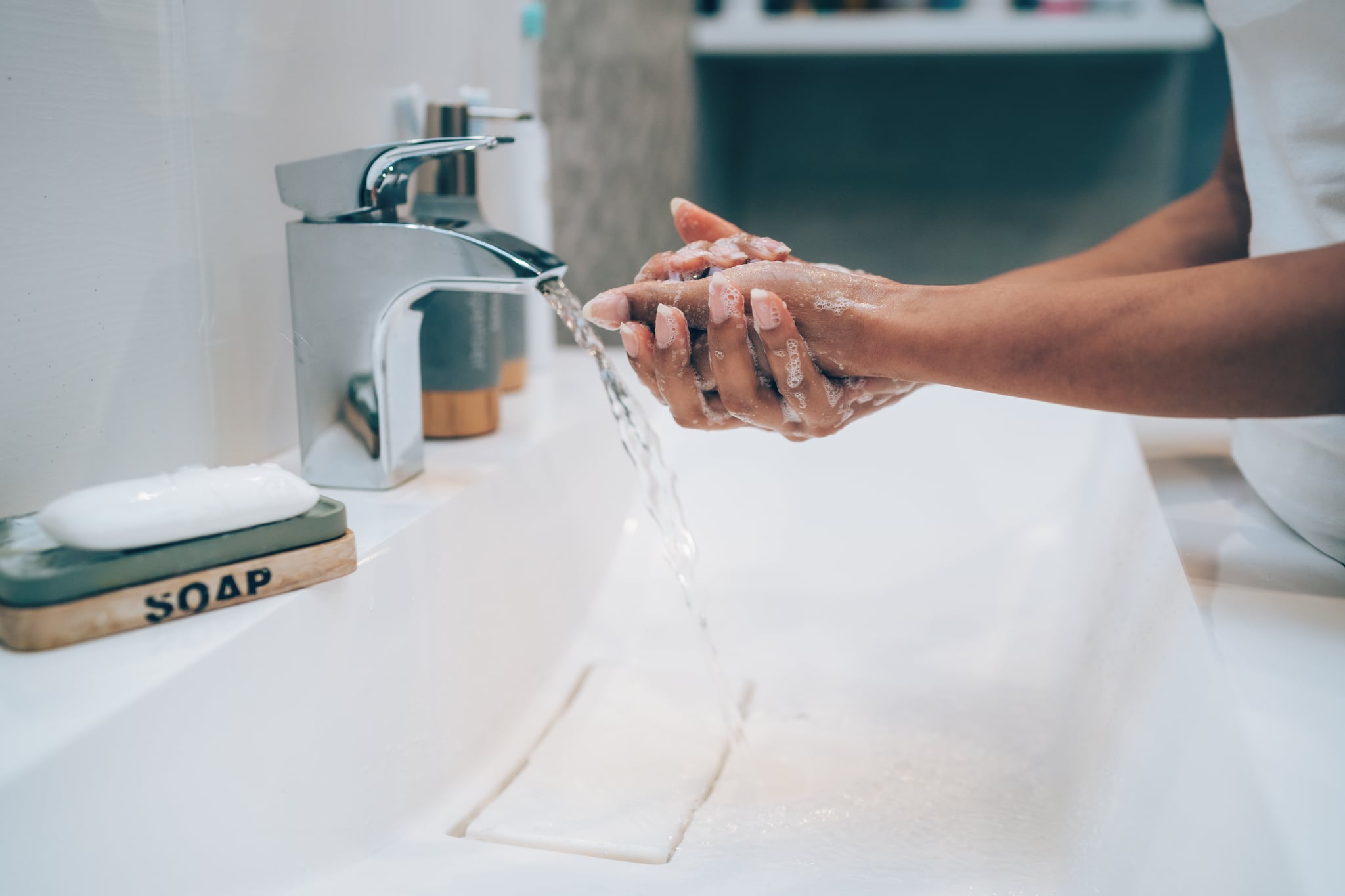
Handwashing is important every day, but it’s especially crucial during a pandemic like the novel coronavirus to help keep you and others safe. “The simple act of handwashing with soap is still the best defense that we have against coronavirus,” Myriam Sidibe, PhD, a senior fellow at the Harvard Kennedy School and recognized handwashing expert, told POPSUGAR. The coronavirus is an enveloped virus — there’s a protective layer around it — and washing with soap and water removes this envelope, causing the virus to die, she said.
Soap can help fight a lot of other “outbreak pathogens and common global killers like diarrheal disease and respiratory infections,” Dr. Sidibe explained. In fact, handwashing with soap can reduce diarrheal rates by at least 40 percent, she noted, and reduce respiratory infections by somewhere in the mid-20-percent range.
News flash! Soap has been around forever — since 2800 BC, Dr. Sidibe said — and it is extremely effective at killing germs, so much so that she did an entire TED Talk about the power of handwashing. When it comes to the coronavirus, Dr. Sidibe, who actually spearheaded Global Handwashing Day, answered some of our scrubbing-specific questions. Read up!
How Often Should People Wash Their Hands?
“At any time, you can have up to 3,200 microbes on your hands, many of which are not harmful,” Dr. Sidibe explained, but your hands can get recontaminated to the point they were at prior to washing after only about an hour. That’s why, she said, it’s important that you wash your hands as regularly as possible. At the very least, you should wash every time you use the bathroom and before you eat. That should be, she noted, about 10 to 12 times per day at minimum.
How Long Should I Wash My Hands?
The World Health Organization (WHO) suggests 40 seconds, and the CDC states that at least 20 seconds is essential for handwashing. Dr. Sidibe said 20 seconds (singing the “Happy Birthday” song twice) should be enough time if you’re scrubbing your entire hands, and use a clean towel to remove any remaining germs.
Should You Still Wash Your Hands as Thoroughly Even If You Don’t Leave the House?
Dr. Sidibe said you should be just as diligent about washing your hands even if you don’t go out in public as much. The coronavirus, she said, is suggested to live on certain surfaces like stainless steel and plastic for days. Practicing good hygiene by making a habit of washing your hands is still important.
Are All Soaps Created Equal?
Yes. Dr. Sidibe said any hand soap or bar of soap you have in your house is fine. “A bar, liquids . . . it’s all equivalent,” she said.
How Much Soap Should You Use For Handwashing?
A drop of liquid soap — or a small amount of soap in general — is sufficient (so don’t go using all those extra pumps!). The most important part, Dr. Sidibe said, is that you have enough to form a soapy lather all over your hands and that, again, you use a clean towel to dry them. Note: Dr. Sidibe said the water temperature doesn’t matter.
Is Hand Sanitizer as Effective as Soap and Water?
A sanitizer that has at least 60 percent alcohol content is recommended, Dr. Sidibe said (the CDC says this, too). It should be your second line of defense against the coronavirus, she explained; washing with soap and water should still be your first line of defense because it’s more effective in killing germs. But if you are going out in public and don’t know if you’ll have soap and water readily available to you, it’s important to keep hand sanitizer on you, she said. Per WHO, you should be cleaning your hands with sanitizer for at least 20 seconds. You can find more guidelines for the use of hand sanitizer here.
What Is 1 Spot on the Hand That People Tend to Forget to Wash?
“People won’t rub the top part of the hand,” Dr. Sidibe said. “So I think it’s important to make sure that you are washing and scrubbing the top as much as you’re scrubbing inside the palm.” Here’s more information on the suggested way to wash your hands.
Is It Helpful to Keep Your Nails Short?
Dr. Sidibe said it could be helpful to have shorter nails since germs could, in theory, get under them. However, she wanted to stress the importance of following that 20-second rule and being thorough, which would include scrubbing under your nails anyway. “I don’t want people to be paranoid as well because I think it’s already really hard to keep a proper routine of doing handwashing with soap,” she explained.
How Can We Make Washing Our Hands a Habit?
On average, four people out of five won’t wash their hands after using the bathroom, Dr. Sidibe told POPSUGAR. We need to establish positive social norms to make handwashing easy to do, she said. A big part of that is increasing the availability of handwashing facilities and soap and water in countries that don’t have the resources. And, in places where running water and soap are very much accessible, people aren’t washing their hands as much as they should. Making handwashing desirable, too, is also key because, as data show, people tend to forget, she said.
There are ways, though, that you can start making handwashing a habit if you haven’t already.
“We need to normalize and celebrate handwashing,” Dr. Sidibe concluded. And it starts with you becoming a stickler for that 20 seconds of thorough scrubbing and really enforcing it in your everyday life. Soap is powerful — remember that!
